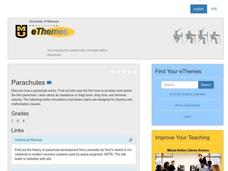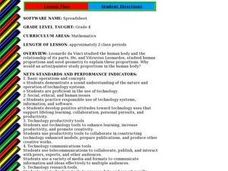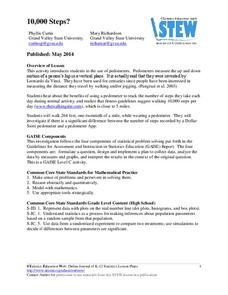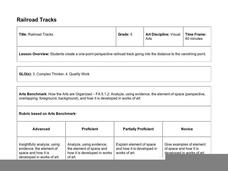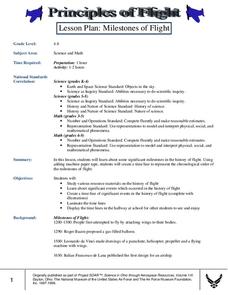Curated OER
The Vitruvian Theory - Does It Apply to You?
Students explore the concept of the Vitruvian theory. In this Vitruvian theory lesson, students collect data from their classmates about their arm span and height. Students compare their ratios of arm span to height...
Curated OER
An Exploration of Leonardo da Vinci's Life and Work
The original Renaissance man, da Vinci is a wonderful subject through which to discuss history, art and science.
Curated OER
Leonardo da Vinci
Middle schoolers select appropriate tools and technology to perform tests, collect data, and display data. They construct appropriate graphs from data and develop qualitative statements about the relationships between variables.
Curated OER
Why Doesn't My New Shirt Fit?
Students test Leonardo da Vinci's view of the human body by measuring various body parts using a tape measure. They create a data table and a scatter plot and then analyze and interpret the results using a graphing calculator.
Curated OER
Art and Anatomy: The Vitruvian Teen
Twelfth graders create an artistic version of a Vetruvian teen. In this anatomy lesson, 12th graders design an experiment to test the theory of the ideally proportioned man. They present their findings in class.
Curated OER
Parachutes
Pupils examine how parachutes work, and research and discuss the first man to envision and sketch the first parachute. They analyze air resistance, drag force, drop time, and terminal velocity.
Curated OER
Body Proportion
Fourth graders measure the height and arm span of various classmates. They use a spreadsheet to design a graph that shows the class measurements from tallest to shortest in metric and standard systems.
Statistics Education Web
10,000 Steps?
Conduct an experiment to determine the accuracy of pedometers versus pedometer apps. Class members collect data from each device, analyze the data using a hypothesis test, and determine if there is a significant difference...
Dick Blick Art Materials
Start with a Circle...
The Golden Ratio. The Divine Proportion. Yup. It's math and art blended into one colorful activity. Young artists combine colored tissue paper circles and parts of circles to create geometric patterns. As a bonus, kids get to figure out...
Curated OER
Principles Of Flight: Wings That Spin
Students discover how flight is possible. In this physics lesson plan, students investigate the properties of a blimp and gyro-copter, comparing rotating wings and fixed wings of aircraft. Students create their own model...
Hawaiʻi State Department of Education
Railroad Tracks
Ahhh the vanishing point! Sounds ominous, but it's not. Fifth graders analyze the use of perspective in Renaissance art. They practice using linear perspective to draw railroad tracks that seem to go on forever. Tip: Make this...
Curated OER
Grade 5: Testing for Tessellations
Fifth graders use formal geometric language to describe polygons (and other shapes) that will tessellate the plane and those that will not. Students make generalizations about the characteristics of a polygon (or other shape) that will...
Curated OER
Milestones of Flight
Students identify significant milestones in the history of flight. In this aviation history lesson, students study various resource materials and construct timelines of significant achievements.
Curated OER
Symmetry: Theory, Reality and Art!
Students explore the concept of geometric symmetry. In this geometric symmetry lesson, students walk around their school and take pictures of objects that demonstrate symmetry. Students use Microsoft Paint to draw the lines of symmetry...
Curated OER
Minerals
Students explore the concept of minerals. In this minerals lesson, students discuss how cooling affects the size of crystals. Students discuss how the structure of minerals is a tetrahedron. Students discuss the structure of silicates...
TED Talks
Ted: Ted Ed: Da Vinci's Vitruvian Man of Math
What's so special about Leonardo da Vinci's Vitruvian Man? With arms outstretched, the man fills the irreconcilable spaces of a circle and a square- symbolizing the Renaissance-era belief in the mutable nature of humankind. James Earle...







